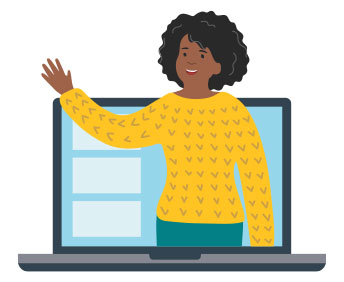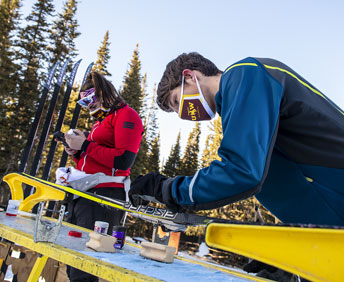
Contact Us
Institutional Communications
Bureau of Mines Building, Room 137
Laramie, WY 82071
Phone: (307) 766-2929
Email: cbaldwin@uwyo.edu
Higher Ed of the Future
May 17, 2021

Students share how they want to see universities change with the times.
By Micaela Myers
Dynamic online and in-person learning, improved support and a welcoming environment for people from all backgrounds are a few of the things students hope to see more of in higher education of the future. Read their thoughts below, as well as what the University of Wyoming is already doing to be the best in the West.
Foster Active Learning
“Providing teachers with more training in incorporating active-learning techniques in their classes would create opportunities for better dialogue between instructors and students and create a safe environment for students to ask questions, be unafraid to fail and truly learn. I hope that higher education will get to a place where the material is retained beyond passing the test.” Sydney Comet, senior, molecular biology major, Aurora, Colo.
“I would like to see universities continue to move toward a more interactive and flexible style of learning, including a greater emphasis on flipped classroom teaching, project-based courses and less dependence upon standardized education—opting instead for the ability to tailor learning to an individual student’s interests and needs.” Austin Shaffer, junior, zoology and environmental systems science majors, geology and honors minors, Mantua, Ohio
“Being within a classroom is an important piece of education. However, hands-on opportunities enable students to actually learn how to apply this knowledge. Field weeks have allowed me to meet people within my field who have helped me understand what I am getting into and why. The higher education of the future should involve more of these real-world opportunities.” Paige Trent, senior, environment and natural resources and energy resource management and development major with a concentration in professional land management, Laramie, Wyo.
Encourage Involvement and Put Students First
“I think I got lucky with the support system that I have. Every supervisor, adviser and director whom I have had the chance to work with has taught me something that had a huge impact on me. I don’t think a lot of students who aren’t as involved get to make those connections, so I think encouraging more student involvement will be beneficial.” Andrea Perez, senior, business and marketing major, graphic design minor, Cheyenne, Wyo.
“I would like to see universities put the students first. There’s a lot of big decisions that are made without having students top of mind. When big decisions are made, the question should always be, ‘Is this in the best interest of OUR students?’” Shelbey Prusia, December 2020 graduate, communication major, journalism minor, Torrington, Wyo.
Become More Inclusive
“I would like to see higher education be more accessible to those who seek it. The diversity of students in higher education has been steadily climbing over the past several years. I want to see a continuation of this trend, as well as even more celebration of differences. Regardless of ethnicity, nationality, gender, sexuality, socioeconomic status, creed, age or ability, ‘The World Needs More Cowboys’ of all backgrounds.” Marcis Bravo, junior, music education major, Cheyenne, Wyo.
“I think it’s important that higher education is accessible to more students and seeks out students who might not have the resources to do it on their own. I’ve only had a couple professors ask me if I want to pursue graduate school, and
I think universities should try to help more students pursue that.” Claude Cole, junior, American studies major, pre-law minor, Palo Alto, Calif.
“I think that colleges and universities come out of a system that was tailored toward high social economic status, majority culture. I think a lot of people learn in different ways. I know people who didn’t go to college and have skills I’ve never learned yet they can’t be recognized for those skills because they don’t have a piece of paper with a degree. I really struggle with the inherent inequity between people with different socioeconomic status and backgrounds.” Madelyn Lundblad, senior, elementary education and psychology major, Aurora, Colo.

Expand Online Learning and Face-to-Face
“The push for remote learning is making it harder for students and teachers alike to care about learning because of the lack of interaction that stimulates genuine questions and a positive learning environment. Hands-on practical skills cannot be taught with a video substituted for an invested instructor demonstrating in real time, three dimensions and instantaneous feedback.” Amanda Christensen, senior, chemical engineering and physiology major, honors minor, Buford, Wyo.
“I think that we should take more advantage of the technology that we have at our fingertips. I think not only should we make it more common for guest lecturers to be from other universities and countries, but students also should collaborate between institutions across the nation and internationally.” Clara Delahaye, senior, animal and veterinary science major, honors and French minor, Jackson, Wyo.
“How we’ve had to be flexible with our learning through COVID-19 has taught us that so many students from so many backgrounds can be successful students. An online platform can be integrated with in-person to provide an education for everybody.” Brayden Gaston, graduated December 2020, physiology major, disability studies, neuroscience and honors minor, Jackson, Wyo.
“I think the next level of online learning is more oral presentations, because I think that can really combine those two modalities of face-to-face dialogue with the online platform. All of my classes are online right now, so we’re responding on messaging boards. But there’s still that component of needing to learn to speak to one another and project ourselves as colleagues and professionals.” Cristina Gonzalez, senior, BSN (nursing) completion program, Lander, Wyo.
Let Disciplines Evolve
“I’d really like to see different education routes for graduate school. For psychology, if you get a clinical Ph.D., everyone has a general course of study until they’re done with their doctorate. It seems like, with that much schooling, everyone’s going to start thinking the same. A lot of times psychologists and psychiatrists don’t really communicate. Psychiatrists tend to write the DSM, though psychologists use it do treat disorders. I’d like to see the two connect more.” Anthony Campese, senior, psychology major, Gillette, Wyo.
“In art education, I’d like to see more involvement in the community beyond teaching elementary to high school students—like going to elderly care homes—and really get that sense of helping your community.” Ashlyn Woods, junior, art education and BFA major, Loomis, Calif.
“I would like to see universities allow students to specialize prematurely within their educational career. Some general education requirements are irrelevant and incur costs with little or no benefit to the student. I would like to see universities increase the flexibility of degree programs and allow students to forgo general education requirements unrelated to their major or degree programs.” Danna Hanks, junior, pharmacy major, Powell, Wyo.
“I’d love to see coursework on building relationship with students—the socio-emotional aspect—to better prepare teachers to come into the classroom. I’d also like to see an emphasis on how new teachers can utilize some of the resources in their new communities to stay the course so they don’t get burned out.” Travis Moore, fall 2020 graduate, doctor of education, Rawlins, Wyo.
“I would like for universities to re-think what their role is in the 21st century. In particular I would love to see more synergy between various colleges. I think this would benefit universities by allowing them to create new degree and certificate programs with no or little additional administrative burdens. It would also create new types of discourse through exposure to other college’s ways of thinking and perspective. In addition, I think there needs to be a re-evaluation of administrative burdens and how adjunct professors are paid and treated.” Ryan C. Sedgeley, law and environment and natural resources J.D./M.A. candidate, Yellowstone, Wyo.
Explore Different Points of View
“I hope that in the future higher education aims to create environments where students are allowed and encouraged to explore differing points of view and grow their own knowledge. Universities should make sure that their students are given the correct tools and aim to help increase the confidence of their students to problem solve and utilize what they learn in their classes to deepen their understandings.” Madison Tinker, senior, kinesiology and health major, honors minor, Casper, Wyo.
Step Up Support
“I would love to see more financial help for undocumented students and more financial aid in general to avoid student debt that delays many students’ futures.” Nicole Reyes Aguilar, junior, sociology and economics major, marketing minor, Cheyenne, Wyo.
“I would like to see higher education invest more effort into the prevention of food insecurity among higher education students.” Kerry Ray Schinkel, senior, food science and human nutrition major, Rawlins, Wyo.
“I would like to see universities have more support for nontraditional students. I have a 3-year-old child, and the cost of child care while I am in school is incredibly challenging. I would like to see universities start to provide some low-cost child care options. I would like to see more understanding from professors. I would like there to be more clubs and events that are child-friendly.” Rebecca Lawrence, junior, microbiology major with a concentration in medical microbiology, Brookwood, Ala.
“I hope to see a greater emphasis placed on student mental health and post-grad job placement, as well as even more exchange programs.” Alea Denney, freshman, international studies major, Keene, N.H.
Ellbogen Center for Teaching and Learning
Aiming to help instructors teach and design courses most effectively, the Ellbogen Center for Teaching and Learning (ECTL) is UW’s hub for faculty development.
From workshops to one-on-one consultations, the center supports anyone in an instructor role at UW. Since the pandemic, much of its resources went to bringing instructors up to speed on the best practices for online courses and teaching in general. But the center offers much more, including supporting the scholarship of teaching and learning to study best practices.
“We also offer certifications in teaching and learning that any instructor can pursue,” says Director Janel Seeley.
This year, ECTL turns 30 and is planning a number of events to mark the anniversary, including book groups on Radical Hope: A Teaching Manifesto by Kevin Gannon, with plans to bring the author to campus in September as part of a larger celebration symposium.
“The book is about engaging and serving students,” Seeley says. “We’re also hoping to start a podcast this fall about all things teaching and learning.”
In addition, competitions will feature students submitting videos on their favorite assignments
and faculty members talking about their passion for teaching. You can learn more about the ECTL at uwyo.edu/ctl.

Jordan Miner and Spencer Canen measure the temperature and snow structure as part
of their Art and Science of Nordic Ski Training, Racing and Coaching class.
UW Embraces Active Learning
“Active learning is anything that is both hands on and minds on,” explains Rachel Watson, director of the Science Initiative Learning Actively Mentoring Program (LAMP). “An analogy we can make is that it’s like you’re knitting a sweater and actively building upon it and seeing how new patterns connect. If you’re given ownership over the learning—for example, given a case study and asked to solve the example you’re seeing there—that is a lot different than hearing a professor tell you something.”
Active learning creates better outcomes for students, including higher attendance and better pass rates. “We know it can increase student success, with close to a 50 percent reduction in fail and withdrawal rates,” Watson says.
LAMP trains college educators at UW and community colleges in a sustained yearlong program; additionally, LAMP spreads active-learning best practices to K–12 educators by supporting summer professional development and connecting them with in-reach and outreach opportunities. To support UW professors in the classroom as well as educate the next generation on the concepts, LAMP trains undergraduates, post-bachelor College of Education students and graduate students as learning assistants.
When asked how she’d like to see higher education change in the future, Watson says: “What would happen if we took everything we know about how the brain works best, and we actually practiced that? We know the brain works best when we’re outside, when we’re on the move, when we’re in an unstable environment and when we’re constantly solving problems.”
Optimal learning also includes things like getting enough sleep and good nutrition. Relationships are also key, Watson says. “Good teaching and catalyzing change in teaching are about relationships—that need to be part of something and to be appreciated.”
Luckily, UW is known for its personable professors who go out of their way to help students achieve their goals.
Watson also wants to see students join the cross-disciplinary collaboration movement on campus and be able to earn degree credits for classes outside their disciplines. “Complex problems can’t be solved by one discipline alone,” she says. “We need our philosophers at the same table as our neuroscientists and microbiologists—all working to solve the same problem.”
Contact Us
Institutional Communications
Bureau of Mines Building, Room 137
Laramie, WY 82071
Phone: (307) 766-2929
Email: cbaldwin@uwyo.edu


